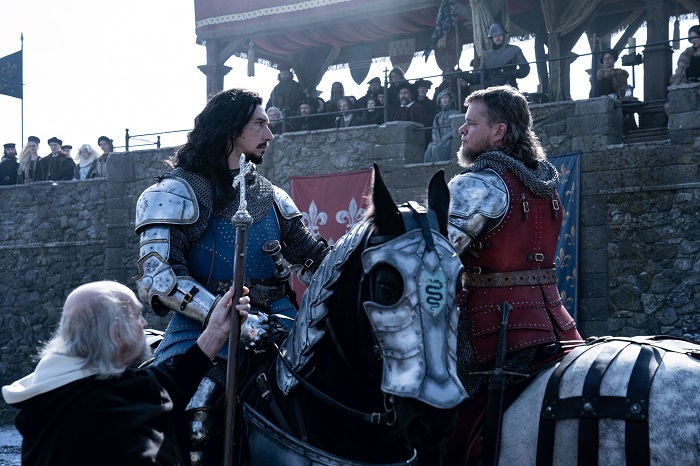The Last Duel (Scott, 2021)
The Last Duel is a big, new, studio film that is neither franchise, reboot, nor sequel. It comes at a point where everyone, even some of my friends who are especially cautious about the pandemic, seems anxious to get back to the movies. I don’t think it’s an exaggeration to say that we are all itching for the next big hit. Ridley Scott’s new medieval epic arrives with a lot going for it, and if it isn’t quite the home run I was hoping for, it is at least a reassurance for another week or so that the theatrical movie experience isn’t dead yet.
Based on Eric Jager’s book of the same title, The Last Duel provides the context for France’s last recorded trial by combat. Sir Jean de Carrouges (Matt Damon) claims that his wife was raped by Jacques Le Gris (Adam Driver). The latter refutes the charge and the king agrees to let there be blood to settle the matter.
Ever since running across Barabra Tuchman’s aptly title A Distant Mirror in my college days, I’ve been attentive to how representations of the middle ages tend to gravitate towards one of two polar assumptions: those people were just like us, or those people were unknowably alien, with lives unfathomable to us. Nicole Holofcenter’s screenplay definitely falls in the first camp. By the end, I was half expecting an after-the-credits montage of historical women from Marguerite to Christine Blasey Ford to whom allegedly Christian nations have said, “It’s less important for us to find out whether this really happened than it is to explain to you why it’s your fault if it did…”
There’s certainly nothing wrong with drawing comparisons between conditions for women in past ages and those faced by women today. But if that’s the end goal here (and I think it is), why saddle yourself with a Rashomon structure? The central theme of Kurosawa’s oft-imitated film is that memory is subjective, that each person’s version of the story makes himself or herself look better, and that nobody’s story is objectively true. There’s certainly a Rashomon story somewhere in this material, but to fully develop it would mean at least allowing the audience to question the woman’s point of view even if the basic facts are not in dispute. The film’s just not interested in doing that, and I can’t say that I blame it. Instead, it posits that Le Gris’ interpretation and de Carouges’ interpretation are inextricably conditioned by their environment, by what society and the church have told them all their lives is true. The film becomes an indictment of the infrastructure that disseminates misinformation rather than a tragedy about the effects that misinformation can have on otherwise well-meaning people.
The other problem with the Rashomon structure is that it needlessly bloats the film. When the first title card announces that it is Chapter One and will be “the truth” from Jean de Carouges’s point of view, we more or less know what chapters two and three will be. Even as Chapter One is playing, it is easy to identify which scenes (hint the ones with two or more of the principles in them) will be repeated and how the events will be otherwise construed.
For my money, the best film in recent memory that plays this card was the sadly undervalued The Disappearance of Eleanor Rigby: Him and Her. While that film did offer some slightly different interpretations of shared scenes, it excelled by showing us different contexts that made us understand the points of view rather than simply asking us to chose between them. The Last Duel may posit that people are telling the truth as they see it (though that is up for debate in at least one of the men), but it never invites us to see perspective as anything more than a perceptual prison of one’s own making.
Also, I haven’t read Jager’s book, but I’d be shocked if there weren’t at least some readings that take the facts of de Carouges’s life and Le Gris’s life and not note that a manufactured political grievance could provide one with the opportunity to win by force what he could not through political channels.
For all that, the film concludes much more ambiguously than I expected, and for that, it gets a slight recommendation. I wish more of the ambivalence of the film’s ending had worked its way into the film proper, but the performers are good, and the film does not romanticize the violence, being physical or sexual.

